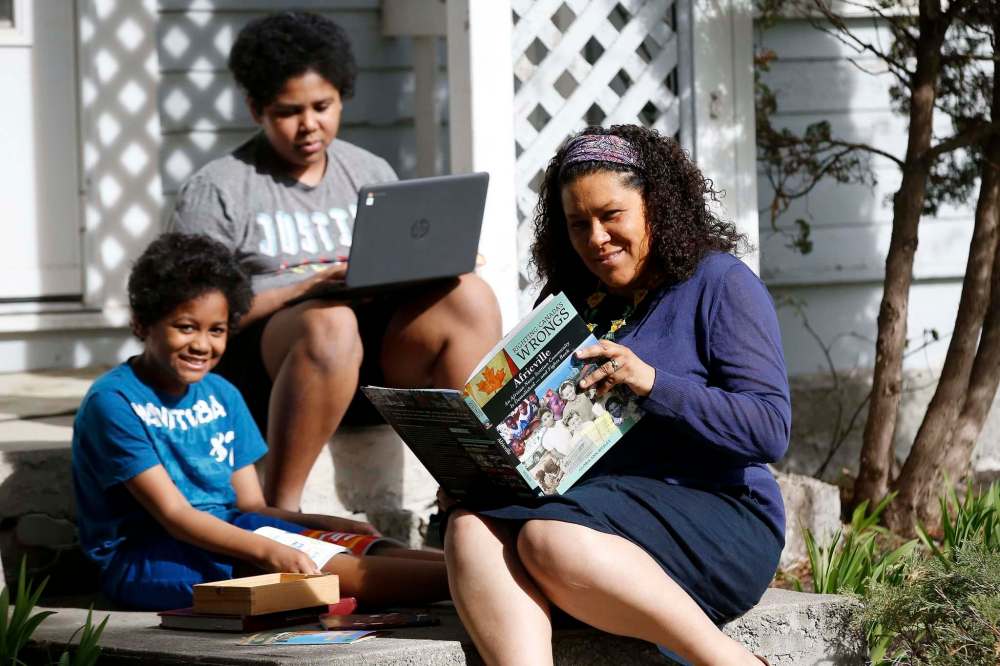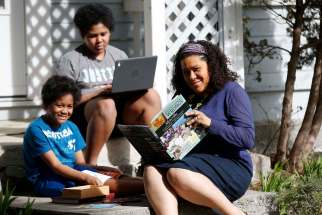Parents work, life out of balance Homeschool pressure amps up pandemic spotlight on child care
Read this article for free:
or
Already have an account? Log in here »
To continue reading, please subscribe:
Monthly Digital Subscription
$0 for the first 4 weeks*
- Enjoy unlimited reading on winnipegfreepress.com
- Read the E-Edition, our digital replica newspaper
- Access News Break, our award-winning app
- Play interactive puzzles
*No charge for 4 weeks then price increases to the regular rate of $19.00 plus GST every four weeks. Offer available to new and qualified returning subscribers only. Cancel any time.
Monthly Digital Subscription
$4.75/week*
- Enjoy unlimited reading on winnipegfreepress.com
- Read the E-Edition, our digital replica newspaper
- Access News Break, our award-winning app
- Play interactive puzzles
*Billed as $19 plus GST every four weeks. Cancel any time.
To continue reading, please subscribe:
Add Free Press access to your Brandon Sun subscription for only an additional
$1 for the first 4 weeks*
*Your next subscription payment will increase by $1.00 and you will be charged $16.99 plus GST for four weeks. After four weeks, your payment will increase to $23.99 plus GST every four weeks.
Read unlimited articles for free today:
or
Already have an account? Log in here »
Hey there, time traveller!
This article was published 19/05/2020 (2033 days ago), so information in it may no longer be current.
As they shuffle between work or a job search, household chores and homeschooling, overworked parents — who are, more often than not, mothers — are counting down the days until the last day of school.
Some have given up academic work for the year to lessen the load. Others, such as Zilla Jones, have given up any semblance of work-life balance.
“I make it work; if I don’t sleep, I don’t sleep,” said Jones, who has been simultaneously working from home as a full-time lawyer and providing homework help to her two school-age children throughout the COVID-19 pandemic.

Every morning, the Jones family jots down a to-do list, which may include, but is not limited to: math questions, music lessons and virtual bail hearings. If Jones is on the overnight shift, during which she offers urgent legal aid advice, she powers-through the satellite school day with a quick morning nap.
“I’m doing this for my kids,” said Jones, whose children are in grades 3 and 7. “If you opt out of schooling, nobody’s going to pick up the slack for you.”
Researchers have long-documented the implications of what Arlie Hochschild coined as the “second shift” more than 30 years ago: the idea that when women join the workforce, they maintain a disproportionate number of hours doing unpaid domestic work. In 1989, Hoshschild concluded, in addition to a woman’s paid job, her household responsibilities added up to the equivalent of another full-time job.
The novel coronavirus pandemic has added to the laundry list of domestic duties mothers squeeze into their schedules. Their days now include 24-7 child care, schoolwork support and comforting children who either don’t understand why they are suddenly only allowed to have video call playdates or are overwhelmed by the dangers of the virus.
A new survey commissioned by the New York Times suggests while all parents are taking on more housework during the pandemic, mothers are handling more than their fair share.
Eighty per cent of mothers with children under 12 reported spending more time on distance learning than their partner, according to the April survey of 2,200 American adults. It also found nearly half of fathers reported being the primary homeschooler, but only three per cent of female respondents said their spouse is doing more.
“I make it work; if I don’t sleep, I don’t sleep.” – Zilla Jones
(The survey was conducted by polling firm Morning Consult; its margin of error is plus or minus eight points for men and plus or minus seven points for women.)
“When we think about front-line workers, we’ve been thinking about the medical profession and our food supply, but we haven’t been thinking about (mothers),” said Fiona Green, a professor of women’s and gender studies at the University of Winnipeg whose expertise is in feminist parenting and gender socialization.
Poverty and domestic violence remains ever-present, Green said; meanwhile, mothers of all kinds now have to shelter-in-place, deal with interpersonal dynamics and manage both their personal and children’s anxieties — and they have to do so with limited support.
Green and co-editor Andrea O’Reilly have started collecting submissions from mothers about their experiences during the pandemic for their new book, Mothers, Mothering and COVID-19: Dispatches from a Pandemic.
“What’s alarming to me is that this work continues to be invisible, but it’s also been expanded exponentially,” she said, adding one way to cope is by venting to others and validating each others’ motherhood struggles amid the pandemic.
Feminist scholars and activists are also calling for a feminist response to COVID-19 to ease the burden on mothers, women, girls and LGBTTQ+ Manitobans, in consideration these groups have been disproportionately affected by job losses and child-care challenges.
“When we think about front-line workers, we’ve been thinking about the medical profession and our food supply, but we haven’t been thinking about (mothers).” – Fiona Green
The Institute for International Women’s Rights — Manitoba has launched a campaign to call on the Pallister government to take an intersectional approach in legislation, policies and programs to ensure no Manitoban is left behind. Among their demands, establishing paid sick leave for all workers, implementing a living wage and adopting universal child care.
Board member Florence Okwudili said all mother figures will take on more domestic responsibilities long after the pandemic, since they will have to be extra cautious about sanitation and take time off if children have even the slightest cough.
A mother and grandmother, Okwudili said she’s already noticed her responsibilities have heightened; she lives with two of her grown children and three young grandchildren.
When she’s home from her full-time job as a health-care worker, she takes her grandchildren out on walks — which, before playgrounds opened, had to be meticulously planned to ensure they didn’t see a playground to tempt the children. She has also moved nearly all the furniture from her living room to make space for the children to play indoors.
The pandemic has undoubtedly placed a spotlight on how critical child care is, whether it be in the form of daycare or school, said Corinne Mason, a queer parent who is taking turns with her partner, as the couple balances home offices and taking care of a three-year-old.
“Reproductive labour has to happen; so many people are at home doing that labour, at the expense of their own jobs,” Mason said. “I really hope that folks see how essential that service is for people and (fund) it properly.”
“I really hope that folks see how essential that service is for people and (fund) it properly.” – Corinne Mason
Now is the time, Mason said, for a national child-care strategy.
maggie.macintosh@freepress.mb.ca
Twitter: @macintoshmaggie

Maggie Macintosh reports on education for the Winnipeg Free Press. Funding for the Free Press education reporter comes from the Government of Canada through the Local Journalism Initiative.
Our newsroom depends on a growing audience of readers to power our journalism. If you are not a paid reader, please consider becoming a subscriber.
Our newsroom depends on its audience of readers to power our journalism. Thank you for your support.
History
Updated on Wednesday, May 20, 2020 9:27 AM CDT: Amends wording to refer to parent Corinne Mason







